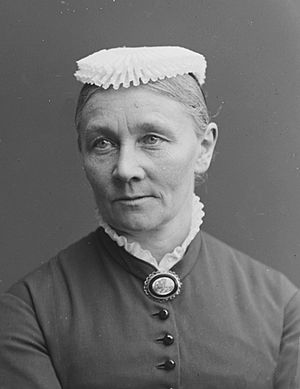Emmy Rappe facts for kids
Quick facts for kids
Emmy Rappe
|
|
|---|---|
 |
|
| Born | 14 February 1835 |
| Died | October 19, 1896 (aged 61) |
| Occupation | Nurse and principal for a nursing school |
| Known for | Pioneer and founder of the Swedish nursing education |
Emmy Carolina Rappe (born February 14, 1835 – died October 19, 1896) was a Swedish nurse and a leader in nursing education. She was a true pioneer who helped start modern nursing education in Sweden. She was the first nurse in her country to be professionally trained. She also became the first principal of Sweden's very first nursing school.
Contents
Early Life and Education
Emmy Rappe was born into a noble family. Her father was Baron Adolf Fredrik Rappe. She grew up with a strict education that taught her to be responsible and smart with money. As an unmarried noblewoman, she stayed under her family's care until she was thirty years old.
From a young age, Emmy was very interested in medicine and helping others. Her aunt, Elisabeth "Elise" Rappe, was said to have inspired her to pursue nursing.
Becoming a Nurse
In 1866, the Swedish Red Cross wanted to open a nursing school in Sweden. They needed someone well-trained to lead it. Sophie Adlersparre, a famous Swedish writer, made a special agreement with Florence Nightingale. Nightingale was a very famous nurse from Britain. The plan was for the chosen person to be trained by Nightingale herself in London.
Emmy Rappe was chosen for this important task. She traveled to London in 1866 to study at Florence Nightingale School of Nursing and Midwifery. This school was part of St Thomas' Hospital (which is now part of King's College London). Florence Nightingale taught Emmy personally and was very happy with her as a student. Emmy believed that nursing was a special calling, a job you felt truly meant to do.
Leading the Way
Emmy Rappe returned to Sweden in 1867. She continued her studies at Sahlgrenska sjukhuset hospital in Göteborg and other clinics in Stockholm.
From 1867 to 1877, she became the head nurse at the new Surgical Clinic at the Uppsala Academic Hospital. At the same time, she was the principal of the nursing school there. This school was also new and had been started by the Red Cross. This was a very important step because it was the first time nurses in Sweden could get formal training that was not connected to a religious group. Before this, the only formal nursing education was at a deaconess institution opened by Maria Cederschiöld in 1851.
Making a Difference
Emmy Rappe was a pioneer, meaning she was one of the first to do something new and important. Because of this, she sometimes faced challenges from people in charge. As a Baroness, some people were surprised that she chose to work as a nurse. She even refused to take a salary for her work.
Emmy worked hard to make nursing a respected profession. She encouraged nurses to support each other and be proud of their work. She believed nurses needed to be very skilled in medicine and have high moral standards.
Later, from 1877 to 1886, she supervised the Uppsala Central Hospital for people with mental health conditions. Even after she retired, she stayed active. She worked as a hospital inspector and continued her involvement with the Red Cross. Emmy Rappe was also related to Thorborg Rappe, who was an expert in educating people with intellectual disabilities.
Emmy Rappe received important awards for her work. She was given H. M. The King's Medal in 1877 and the Illis Quorum medal in 1895.
Legacy
To honor her contributions, a road in Ulleråker, Uppsala, is named after her. It is called Emmy Rappes väg, which means Emmy Rappe Street.
See also
 In Spanish: Emmy Rappe para niños
In Spanish: Emmy Rappe para niños
 | Claudette Colvin |
 | Myrlie Evers-Williams |
 | Alberta Odell Jones |

